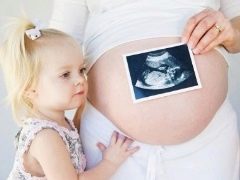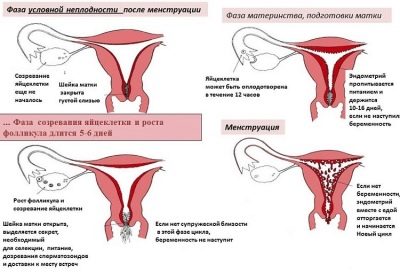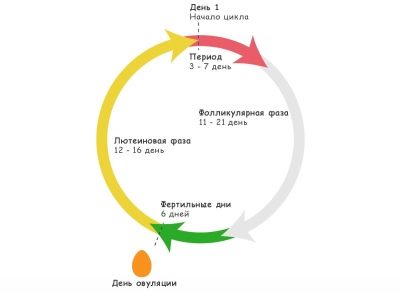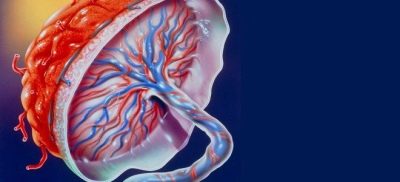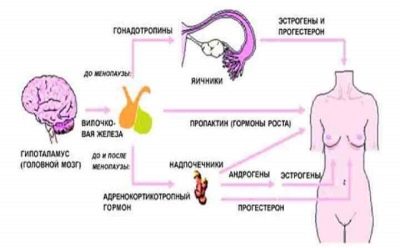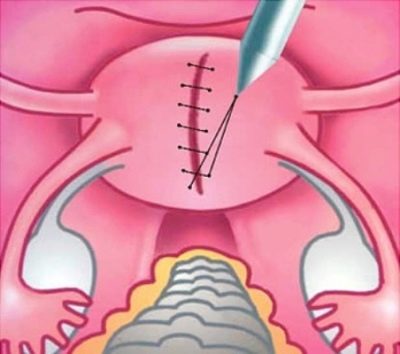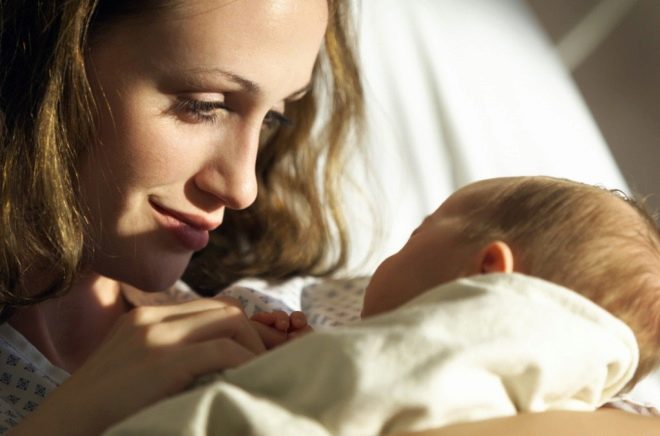How many months after birth can I get pregnant again?
Even very prudent women who are accustomed to planning such important events as conceiving a child can fall into the “trap” of their own body and become pregnant unexpectedly some time after giving birth. Not always re-pregnancy will be desirable and permissible, and therefore the spouses may be faced with difficult moral choice. In this article we will look at how long the new mother’s reproductive health is restored and how to plan a new pregnancy after childbirth.
Can I conceive immediately after the birth of the baby?
It is difficult to say why, but the people are of the opinion that a woman remains sterile for some time after giving birth, that is, she cannot become pregnant. This is a dangerous delusion that not one hundred young mothers brought to the gynecologist's offices in a short time after giving birth to an abortion. To the question whether you can get pregnant after giving birth, there is no definite answer. Pregnancy in the absence of contraceptive measures will necessarily occur in a healthy woman as soon as her reproductive system restores its functions. - the ovaries will begin to work in full force, the eggs will mature, ovulation will occur.
The terms are individual. For some women, the cycle is restored within a month, and for others - after six months or more, there are those who take more than a year to do this. But a big mistake is the attempt to count the recovery from the moment of the first menstruation. Menstruation completes the female cycle, rather than starting it, the endometrium is rejected with blood secretions when the egg has matured and fertilization has not occurred. That is, a couple of weeks before the first menstrual period, a woman is already fertile and, according to the laws of nature, may well conceive a new life.
The problem is that no one knows when exactly this very first menstruation will come. The process of restoring the menstrual cycle after childbirth takes place during different times, it is influenced by many factors:
- mode of delivery - caesarean section or natural childbirth;
- features of the postpartum period, the presence or absence of complications;
- breastfeeding or lack thereof;
- the individual characteristics of the woman’s body;
- age and health.
After a cesarean section, recovery of the cycle may take slightly longer than after physiological delivery through the natural reproductive tract. If the postpartum period turned out to be complicated, then the recovery of the female cycle may also be delayed. When breastfeeding, in the absence of hormonal disorders, the cycle is restored only a few months after childbirth, and at a young age, moms get fertile abilities more quickly than “aged” mature women.
Features cycle recovery and fertility
Immediately after childbirth, regardless of the manner in which they occurred, abundant blood secretions with clots are secreted. These are not monthly, and these allocations cannot be taken as a starting point. The discharge after childbirth is called lochia. This is how the process of cleansing the uterus from blood, fetal membranes and placenta takes place. At birth, the placenta is born itself or is separated manually. For caesarean section, the surgeon removes the “baby seat”.In any case, the integrity of the blood vessels is disrupted, which for nine long months managed to grow together and turn into a single circulatory system - “mother-placenta-fetus”.
Thus, after delivery, a rather extensive placental wound is present inside the uterus. It is she who bleeds as the uterus shrinks to its former size. Lochia can last throughout the recovery period, that is, up to 6-8 weeks after delivery. After physiological labor, they usually end a couple of weeks earlier than after surgery.
During the isolation of lochia after any childbirth, sexual life is contraindicated, since the uterus is defenseless against infections that can penetrate through sexual contact.
If spouses are sensible and responsible people, if they value women's health, they do not violate this prohibition and it’s not worth talking about the probability of becoming pregnant during this period. Violators must be vigilant - pregnancy is possible.
When the uterus is completely cleared, the discharge becomes normal. By this time, the hormonal background is usually substantially rebuilt. In theory, from this point on, the female reproductive organ is ready to accept the fetus again. But this is only theoretically. In practice, a woman needs more time to restore the nervous and endocrine systems, so that the organs of the reproductive system return to their normal functioning.
At a certain point, the balance of hormones comes to the correct ratio in the ovaries, which did not work as intended during pregnancy, the process of oocyte maturation begins again, which is released on the day of ovulation. If conception does not occur, menstruation begins in two weeks.
The first menstruation after childbirth or cesarean is almost impossible to confuse with anything else. No need to think that the monthly will again “come” in those days in which they “came” before conceiving a baby, because now the cycle is shifting. It is for this reason that after the end of lochia, when a woman resumes sex, it is important to use barrier contraceptives (condoms) before the first menstruation comes, since it will be almost impossible to determine ovulation before the first menstruation.
The first periods - a signal that the female reproductive system has returned to its usual rhythm. The first menstruation may be a little shorter than before, and more scarce, but after 2-3 months the cycle returns to normal.
The psychological state of the young mother influences the time it takes to restore fertility after childbirth; recovery after postpartum depression slows down significantly. An important factor is considered and the lifestyle of a young mother - if she looks like a zombie due to constant lack of sleep and night feedings, then it is premature to talk about the restoration of sexual function. It also plays the role of whether she feeds the baby with the breast or the baby is on artificial feeding.
How does breastfeeding affect?
A woman who, for whatever reason, does not breastfeed, can theoretically recover and gain fertility again within a month and a half after giving birth. This factor must be taken into account when resuming sexual relations with a partner after the birth of a baby.
Breastfeeding imposes on the ability to conceive again their adjustments. Breast milk production is a complex hormonal process. The pituitary gland of a woman produces a large amount of prolactin when the baby is nursing. This hormone is a component of breast milk and regulates lactation in general. And then there is no big difference - the woman gave birth to herself or she was given a caesarean section. Lactation in those and others proceeds according to the same hormonal laws.
Prolactin inhibits the production of progesterone and partially blocks the production of estrogen.Because of it, the sex glands cannot function normally and egg maturation usually does not occur. No egg - no ovulation, no monthly.
But feeding to feeding - discord. One woman feeds the baby every 2 hours and uses only her mother's milk, not feeding the baby with artificial formula, the other breast milk combines with the adapted formula. In the first, menstruation does not come any longer, since prolactin, with frequent attachment to the chest, produces more. But the second mother may well become a "victim" of a sudden and unexpected pregnancy, even while breastfeeding a baby. The fact is that low production of prolactin gives progesterone a chance to produce, and the process of restoring ovarian functions may well start, while the woman will not feel anything unusual.
Usually, in the first six months of a baby’s life, pediatricians recommend only breastfeeding, and only then it is advised to introduce supplementary foods gradually. From this point on, the baby begins to consume a little less milk, which again increases the likelihood of spontaneous recovery of the cycle due to a decrease in the level of prolactin and the onset of pregnancy.
Monthly after the introduction of complementary foods to the diet, the karapuz most often occurs within one and a half to two months, but fertility returns earlier than 2-2.5 weeks at least. And this must be remembered, especially if the new pregnancy is not yet included in family plans.
Risks
A woman's body needs time to recover, because carrying a baby is a serious work and a big load. After childbirth, especially if they were difficult, with a long recovery period, complications, it is better to take a break to allow all organs and systems to return to their usual rhythm of work.
but A pregnancy that occurs even within a year after a physiological birth is not as dangerous as a pregnancy that occurred too soon after a cesarean section.
After operative delivery, it is necessary to take into account that the process of forming an internal scar on the uterus requires separate time. It takes in normal about 2 years. This period is considered the minimum interval between a previous pregnancy and the onset of a new one. An insignificant scar can greatly complicate the course of new carrying - there is a risk of its divergence, rupture of the uterus both during pregnancy and childbirth. There is a possibility of development of placental insufficiency, abnormal development of the placenta, chronic oxygen starvation of the baby, delay in its development.
No matter how previous births are carried out, a hasty subsequent pregnancy creates increased risks of miscarriage in the early period, exhausted inner functional layer of the uterus, the restoration of which also takes time, can adversely affect the formation of the placenta, which can lead to intrauterine death of the baby, to the birth of low birth weight crumbs.
More than 2.5 times the probability of preterm birth increases, even if the first trimester can be successfully overcome, full of dangers and fears.
This does not mean that a woman will not be able to leave a pregnancy and give birth to a baby, because the appearance of a little old one is not such a rare occurrence, especially after physiological first births. It is just that the risks will be higher and the pregnancy may not be as easy as doctors and expectant parents would like.
How to avoid pregnancy?
Given that the truth is harsh, and it is unlike the myths about pregnancy after childbirth, knowing that pregnancy may well occur during unprotected sexual intercourse even during lactation only a few months after the birth of a child, the couple should definitely discuss contraceptive measures. Even if the next child will be welcome and the spouses want a baby-age, the woman needs to take care of her health, because there is little to bear and give birth - children need a healthy and full of strength mother who can grow and educate them.
In the first month after birth, even if they passed without complications, one should refrain from sexual intercourse. When lochia is completed, you can return to sexual relations, but with a condom. It is this contraceptive that is considered the best, in any case, until the period of returning full menstruation.
After the second or third menstruation, a woman is recommended to visit a gynecologist to eliminate late complications and discuss contraceptive measures that would suit both partners, because a simple and reliable condom is not always welcomed by couples.
How much to protect - a rhetorical question. Only the spouses themselves and the doctor who monitors the health of the woman can answer it. In the absence of complications, pregnant again in the interests of the unborn child after physiological birth is not recommended for at least a year - one and a half years. After cesarean section, the term is longer - from 2 years.
A new pregnancy that comes too soon after the previous one may require a woman to wean the baby. When stimulating the nipples of the mammary glands, a certain amount of oxytocin is produced, which increases the chance of miscarriage. Some babies, having felt that the habitual and native taste of mother's milk has changed (against a hormonal background during a new pregnancy), they themselves refuse breastfeeding.
It is also important to remember about psychological and emotional exhaustion. A child requires a lot of effort and attention, and a new pregnancy can significantly complicate the mother’s communication with the baby, because you may need to be hospitalized for medical reasons; - not exactly what he needs.
The choice of methods and ways to avoid unwanted pregnancy today is big. This oral contraceptives, and intrauterine device, and long-term injection contraception. What way to choose, you need to decide with a gynecologist. If a woman plans to become a mother again, it is important for her not to “overdo it” with hormonal contraceptives, and also to exclude any possibility of intrauterine manipulations - curettage, abortions. Therefore, the method should be reliable, safe and gentle, the woman should not have any contraindications. To choose this, taking into account all the individual characteristics, is possible only for a qualified doctor.
For details on how many months after birth you can get pregnant again, see the next video.
